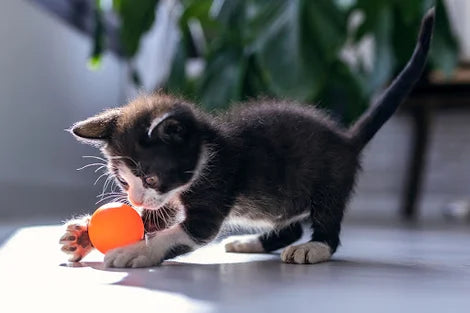In 24 cities

How to Restore Your Cat’s Energy & Bring Back Playtime Fun 🐾
|
|
Time to read 2 min
Enter pincode
Please enter a valid pincode Enter the pincode to check delivery date
Enter the pincode to check delivery date
100% Authentic

Easy return policy

Help us ensure a smooth delivery
SIZE GUIDE
Written by: Shama Hiregange
|
|
Time to read 2 min
Cats are natural hunters—curious, playful, and full of short bursts of energy. But what if your usually active kitty starts sleeping more, ignoring toys, or showing less interest in play? While cats do love their naps (often 16–18 hours a day), a noticeable drop in energy could be a sign of something more.
In this blog, we’ll explore why cats lose energy, the signs to watch for, and how nutrition and supplements can help restore vitality and playfulness.
Every cat has lazy days, but if tiredness becomes the norm, it may point to:
Nutritional gaps – Missing key nutrients like taurine or B-vitamins
Weight gain – Excess pounds can make movement tiring
Joint stiffness – Common in older cats, reducing mobility
Reduced curiosity – A signal of lowered physical or mental stimulation
Look out for these common red flags:
Sleeping more than 16–18 hours regularly
Ignoring toys or skipping play sessions
Weight gain from inactivity
Reduced muscle strength or less jumping/climbing
Lower interest in exploring surroundings
Some nutrients play a direct role in restoring energy and playfulness:
Taurine – Essential for vision, heart health, and strong muscles
B-Vitamins – Boost metabolism and overall energy levels
L-Carnitine – Helps burn fat, supports stamina, and prevents weight gain
Omega Fatty Acids – Promote joint comfort and smooth movement
Not all cats get the nutrients they need from daily meals alone. This is where supplements can make a difference. Vet-approved formulas can:
Fill nutritional gaps
Restore stamina and activity
Keep joints flexible
Encourage curiosity and play
At Supertails, we offer Play & Energy Supplements for Cats that blend taurine, B-vitamins, L-carnitine, and more into tasty chews and powders—even picky eaters love them.
1. How many hours a day should a cat sleep?
Most cats sleep 12–16 hours a day. Sleeping up to 18 hours can be normal, but if your cat sleeps excessively and avoids play, it may signal low energy.
2. Why is my cat suddenly less playful?
A sudden drop in playfulness may be caused by nutritional deficiencies, weight gain, joint stiffness, or underlying health issues. It’s best to monitor their behavior and consult a vet if changes persist.
3. Can diet affect my cat’s energy levels?
Yes. A diet lacking essential nutrients like taurine, B-vitamins, or omega fatty acids can lower energy and stamina. Balanced nutrition is key to keeping cats active.
4. Are supplements safe for cats?
When vet-approved, supplements are safe and effective. They help fill nutritional gaps and support energy, joint health, and overall vitality. Always follow dosage instructions.
5. Which supplements are best for boosting cat energy?
Look for formulas with:
Taurine (heart, vision, muscle health)
B-Vitamins (metabolism & daily energy)
L-Carnitine (fat metabolism & stamina)
Omega fatty acids (joint comfort & mobility)
6. How long will it take to see results from supplements?
Every cat is different, but most pet parents notice improvements in 2–4 weeks—more playfulness, curiosity, and activity.
7. Should I be worried if my cat doesn’t play much?
Not all cats are equally playful, but if your cat shows a sudden loss of interest in toys, weight gain, or excessive sleep, it’s worth investigating possible health or nutritional causes.



In 24 cities

Happy pet parents

For every new member

Exclusive
2 item in cart
₹10,360


